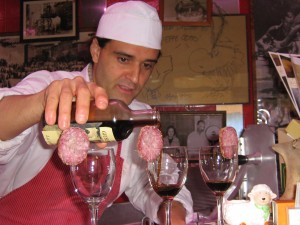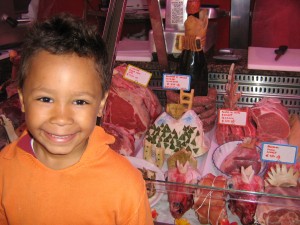How did an obscure Chinese concoction made by fermenting soybeans become one of the world’s favourite all-purpose seasonings? Read about it in The Economist, it’s fascinating. Or listen. I had no idea there were so many different types of the stuff.
Nibbles: Assisted migration, Livestock and ecosystems, Agrobiodiversity tourism, Earthworms, Fish, Cucurbits
- Assisted location is now managed relocation. So that’s alright then.
- Transhumance is good for ecosystem. Oh, and bison too.
- Geotourism in Yellowstone has a website. Can agroecotourism be far behind? I’m afraid so.
- No relationship between parasite load and genetic diversity in earthworms. Alas.
- “The naming of fish is a nightmare. They have more aliases than Maltese pimps.” Which is why Latin binomials were invented, duh.
- Pix of Colombian cucurbit (and other) diversity.
Nibbles: Pepper, Persimmons, Prosopis, Bio-banking
- Is Kampot pepper the best in the world?
- How the Japanese deal with persimmons.
- Making the Atacama bloom. Sort of.
- Bio-banking is all well and good, but will it be applicable to agrobiodiversity as well as orchids and pandas?
Wouldn’t you know it. That Kampot pepper link has rotted away. But you can still find the original thanks to The Wayback Machine.
The connection between wine and beer is agrobiodiversity
Sandor Katz has even had a poem written about his singular obsession:
Come on friends and lend me an ear,
I’ll explain the connection between wine and beer,
And sourdough and yogurt and miso and kraut,
What they have in common is what it’s all about.
Oh the microorganisms, Oh the microorganisms. . .
But don’t let that put you off. Katz is the author of Wild Fermentation: The Flavor, Nutrition, and Craft of Live-Culture Foods. You can read the introduction, and various other excerpts online, as well as order the book, of course. Microbes are agricultural biodiversity too!
Meat, glorious meat
We spent the Easter holidays in Colmurano again, and, like last summer, it was a wonderfully bucolic experience. One of the highlights was definitely a visit to the Macelleria Giuseppe dell’Orso in nearby Loro Piceno. Giuseppe, otherwise known as Beppe Cotto, is an artist with meat. And a bit of a showman as well. He welcomes every customer with some vino cotto and a slice of the local salame.
He’s fond — ok, perhaps overly fond — of bursting into song or poetry at the thought of some of his products, all based on local produce and traditions. His salsicce al vino cotto are fantastic. Also his pâté, which includes cacao somewhere in the production process. It is great to see a young man making a living — and a name for himself — at a local agrobiodiversity-based trade, and really enjoying himself to boot.

